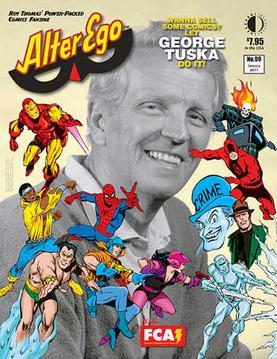Related Research Articles

A fanzine is a non-professional and non-official publication produced by enthusiasts of a particular cultural phenomenon for the pleasure of others who share their interest. The term was coined in an October 1940 science fiction fanzine by Russ Chauvenet and first popularized within science fiction fandom, and from there the term was adopted by other communities.

Fantagraphics is an American publisher of alternative comics, classic comic strip anthologies, manga, magazines, graphic novels, and the erotic Eros Comix imprint.

The Comics Journal, often abbreviated TCJ, is an American magazine of news and criticism pertaining to comic books, comic strips and graphic novels. Known for its lengthy interviews with comic creators, pointed editorials and scathing reviews of the products of the mainstream comics industry, the magazine promotes the view that comics are a fine art, meriting broader cultural respect, and thus should be evaluated with higher critical standards.

Comics Buyer's Guide, established in 1971, was the longest-running English-language periodical reporting on the American comic book industry. It awarded its annual Comics Buyer's Guide Fan Awards from 1983 to circa 2010. The publication ceased with the March 2013 issue. The magazine was headquartered in Iola, Wisconsin, after originally being published in the Quad Cities region.
Comic book collecting is a hobby that treats comic books and related items as collectibles or artwork to be sought after and preserved. Though considerably more recent than the collecting of postage stamps (philately) or books (bibliophilia), it has a major following around the world today and is partially responsible for the increased interest in comics after the temporary slump experienced during the 1980s.

Maggie Thompson, is an American longtime editor of the now-defunct comic book industry news magazine Comics Buyer's Guide, science fiction fan, and collector of comics.
Thomas John Palmer was an American comic book artist best known as an inker for Marvel Comics.
The Grand Comics Database (GCD) is an Internet-based project to build a database of comic book information through user contributions. The GCD project catalogues information on creator credits, story details, reprints, and other information useful to the comic book reader, comic collector, fan, and scholar. The GCD is a 501(c)(3) nonprofit organization incorporated in Arkansas.
Jerry Gwin Bails was an American popular culturist. Known as the "Father of Comic Book Fandom," he was one of the first to approach the comic book field as a subject worthy of academic study, and was a primary force in establishing 1960s comics fandom.

Alter Ego is an American magazine devoted to comic books and comic-book creators of the 1930s to late-1960s periods comprising what fans and historians call the Golden Age and Silver Age of Comic Books.
Interlac is a bimonthly amateur press association devoted to the DC Comics science fiction superhero team the Legion of Super-Heroes. It was the first APA devoted to the Legion and, despite the decline of APAs due to Internet forums, continues to operate to this day. June 2021 marked the 45th anniversary. The site is named after the fictional language of the same name, which is the primary language used in the comic's setting.

Gary Groth is an American comic book editor, publisher and critic. He is editor-in-chief of The Comics Journal, a co-founder of Fantagraphics Books, and founder of the Harvey Awards.

Sheldon "Shel" Dorf was an American comic book enthusiast and the founder of San Diego Comic-Con International. Dorf was also a freelance artist and graphic designer, who lettered the Steve Canyon comic strip for the last 12 to 14 years of the strip's run.

The Comic Reader (TCR) was a comics news-fanzine published from 1961 to 1984. Debuting in the pre-direct market era, TCR was the first regularly published comics industry news fanzine, and was able to secure many contacts from within the ranks of the larger publishers. As TCR increased in popularity and influence, it was able to attract professional artist to illustrate the covers. TCR also proved to be a launching pad for aspiring comic book creators, many of whom published work in the fanzine as amateurs. Contributors from the world of fandom included founding editor Jerry Bails, key editor Paul Levitz, Paul Kupperberg, Tony Isabella, Byron Preiss, Neal Pozner, Don Rosa, Carl Gafford, and Doug Hazlewood.

Harvey T. "Pop" Hollinger was one of the first comic book collectors. He set up his retail and mail order shop for new and used comics in Concordia, Kansas, in the late 1930s.
Houstoncon was an annual multi-genre fan convention which was held between 1967 and 1982 in Houston, Texas. Houstoncon started out as a member of the Southwesterncon series of regional conventions, but eventually became an independent con. The founders of Houstoncon were Roy Bonario and Marc Schooley; Houston area entrepreneur Ed Blair, Jr. was also a key member of the organizing committee.

Rocket's Blast Comicollector (RBCC) was a comics advertising fanzine published from 1964 to 1983. The result of a merger with a similar publication, RBCC's purpose was to bring fans together for the purpose of adding to their comic book collections. It also proved to be a launching pad for aspiring comic book creators, many of whom corresponded and exchanged their work through RBCC, and published work in the fanzine as amateurs.
A comic book convention or comic con is a fan convention with a primary focus on comic books and comic book culture, in which comic book fans gather to meet creators, experts, and each other. Commonly, comic conventions are multi-day events hosted at convention centers, hotels, or college campuses. They feature a wide variety of activities and panels, with a larger number of attendees participating in cosplay than most other types of fan conventions. Comic book conventions are also used as a vehicle for industry, in which publishers, distributors, and retailers represent their comic-related releases. Comic book conventions may be considered derivatives of science-fiction conventions, which began in the late 1930s.
The Goethe Award, later known as the Comic Fan Art Award, was an American series of comic book fan awards, first presented in 1971 for comics published in 1970. The award originated with the fanzine Newfangles and then shared close ties with The Buyer's Guide to Comics Fandom.

Alan L. Light is a publisher involved in comics and pop culture fandom. He is best known as the founder of The Buyer's Guide for Comic Fandom, which was the longest-running English-language periodical reporting on the American comic book industry.
References
- ↑ Comic Book Fanthropology, A Brief History, Part 2
- ↑ Frantz, Ron (2000). Fandom: Confidential. Mena, Arkansas: Midguard Publishing. p. 54. ISBN 978-0-9678273-0-8.
- ↑ Frantz. p.54
- ↑ The Man Behind Kids on Paper
- ↑ Frantz. p.121
- ↑ Frantz. p.99
- ↑ Frantz. p.167